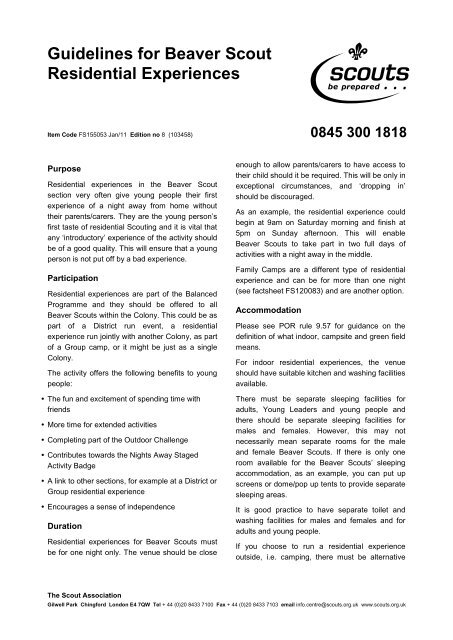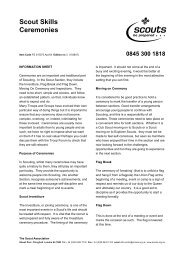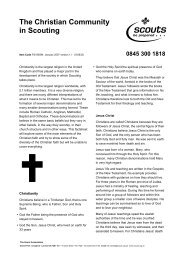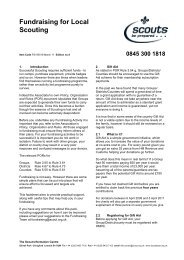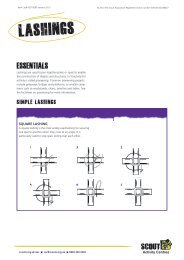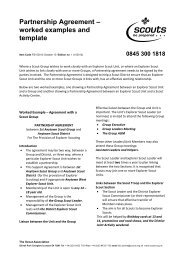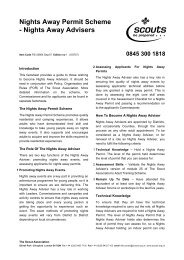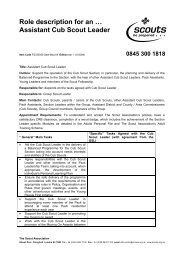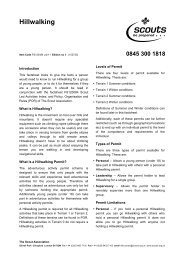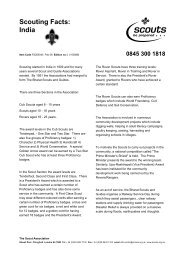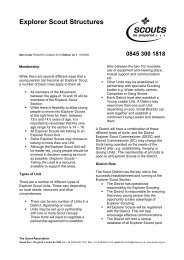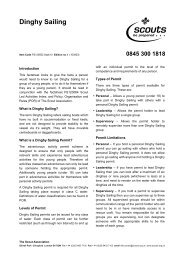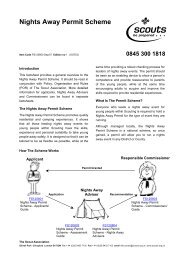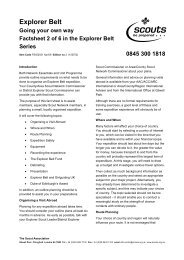Guidelines for Beaver Scout Residential Experiences - ScoutBase UK
Guidelines for Beaver Scout Residential Experiences - ScoutBase UK
Guidelines for Beaver Scout Residential Experiences - ScoutBase UK
Create successful ePaper yourself
Turn your PDF publications into a flip-book with our unique Google optimized e-Paper software.
<strong>Guidelines</strong> <strong>for</strong> <strong>Beaver</strong> <strong>Scout</strong><br />
<strong>Residential</strong> <strong>Experiences</strong><br />
S<br />
Item Code FS155053 Jan/11 Edition no 8 (103458) 0845 300 1818<br />
Purpose<br />
<strong>Residential</strong> experiences in the <strong>Beaver</strong> <strong>Scout</strong><br />
section very often give young people their first<br />
experience of a night away from home without<br />
their parents/carers. They are the young person’s<br />
first taste of residential <strong>Scout</strong>ing and it is vital that<br />
any ‘introductory’ experience of the activity should<br />
be of a good quality. This will ensure that a young<br />
person is not put off by a bad experience.<br />
Participation<br />
<strong>Residential</strong> experiences are part of the Balanced<br />
Programme and they should be offered to all<br />
<strong>Beaver</strong> <strong>Scout</strong>s within the Colony. This could be as<br />
part of a District run event, a residential<br />
experience run jointly with another Colony, as part<br />
of a Group camp, or it might be just as a single<br />
Colony.<br />
The activity offers the following benefits to young<br />
people:<br />
• The fun and excitement of spending time with<br />
friends<br />
• More time <strong>for</strong> extended activities<br />
• Completing part of the Outdoor Challenge<br />
• Contributes towards the Nights Away Staged<br />
Activity Badge<br />
• A link to other sections, <strong>for</strong> example at a District or<br />
Group residential experience<br />
• Encourages a sense of independence<br />
Duration<br />
<strong>Residential</strong> experiences <strong>for</strong> <strong>Beaver</strong> <strong>Scout</strong>s must<br />
be <strong>for</strong> one night only. The venue should be close<br />
enough to allow parents/carers to have access to<br />
their child should it be required. This will be only in<br />
exceptional circumstances, and ‘dropping in’<br />
should be discouraged.<br />
As an example, the residential experience could<br />
begin at 9am on Saturday morning and finish at<br />
5pm on Sunday afternoon. This will enable<br />
<strong>Beaver</strong> <strong>Scout</strong>s to take part in two full days of<br />
activities with a night away in the middle.<br />
Family Camps are a different type of residential<br />
experience and can be <strong>for</strong> more than one night<br />
(see factsheet FS120083) and are another option.<br />
Accommodation<br />
Please see POR rule 9.57 <strong>for</strong> guidance on the<br />
definition of what indoor, campsite and green field<br />
means.<br />
For indoor residential experiences, the venue<br />
should have suitable kitchen and washing facilities<br />
available.<br />
There must be separate sleeping facilities <strong>for</strong><br />
adults, Young Leaders and young people and<br />
there should be separate sleeping facilities <strong>for</strong><br />
males and females. However, this may not<br />
necessarily mean separate rooms <strong>for</strong> the male<br />
and female <strong>Beaver</strong> <strong>Scout</strong>s. If there is only one<br />
room available <strong>for</strong> the <strong>Beaver</strong> <strong>Scout</strong>s’ sleeping<br />
accommodation, as an example, you can put up<br />
screens or dome/pop up tents to provide separate<br />
sleeping areas.<br />
It is good practice to have separate toilet and<br />
washing facilities <strong>for</strong> males and females and <strong>for</strong><br />
adults and young people.<br />
If you choose to run a residential experience<br />
outside, i.e. camping, there must be alternative<br />
The <strong>Scout</strong> Association<br />
Gilwell Park Ching<strong>for</strong>d London E4 7QW Tel + 44 (0)20 8433 7100 Fax + 44 (0)20 8433 7103 email info.centre@scouts.org.uk www.scouts.org.uk
page 2 of 4<br />
accommodation in the event of adverse<br />
conditions. If the accommodation you are using is<br />
no longer habitable then you will need somewhere<br />
that is safe, sheltered and can be slept in.<br />
It is highly undesirable <strong>for</strong> <strong>Beaver</strong> <strong>Scout</strong>s to go<br />
greenfield camping, due to the basic facilities this<br />
type of camping can offer.<br />
Whether using <strong>Scout</strong> premises, public buildings or<br />
camping facilities, steps should be taken to<br />
ensure that there is adequate security to prevent<br />
access by the general public.<br />
A phone should be on hand <strong>for</strong> the whole time<br />
that the residential experience takes place. This<br />
should be either a mobile phone that works or<br />
suitable access to a landline.<br />
Nights Away Permit<br />
The person in charge must hold an appropriate<br />
Nights Away Permit. This doesn’t necessarily<br />
have to be the Colony Leader – see factsheet<br />
FS120800 Nights Away Permit Scheme <strong>for</strong> further<br />
in<strong>for</strong>mation on the appropriate permit needed.<br />
Leadership team<br />
All adults should be known to the <strong>Beaver</strong> <strong>Scout</strong>s<br />
and must have been the subject of the personal<br />
enquiry process set out in POR Rule 3.26.<br />
It is important that there is an opportunity <strong>for</strong><br />
parents/carers and <strong>Beaver</strong> <strong>Scout</strong>s to meet the<br />
leadership team be<strong>for</strong>e the event. It is<br />
recommended that a pre-event briefing meeting<br />
takes place when all involved, including<br />
parents/carers and <strong>Beaver</strong> <strong>Scout</strong>s are present. It<br />
will give leaders the opportunity to reassure the<br />
parent/carers about the event, discuss the plans<br />
<strong>for</strong> the event and explain how the InTouch system<br />
works. It will also give parents/carers and <strong>Beaver</strong><br />
<strong>Scout</strong>s the opportunity to ask any questions they<br />
may have.<br />
There must be enough adults attending the<br />
residential experience to meet the recommended<br />
minimum ratio of 1 adult to 6 <strong>Beaver</strong> <strong>Scout</strong>s plus<br />
the leader in charge (as detailed in POR rule<br />
3.7(g)). It is desirable that the leadership team is a<br />
balance of male and female adults. Members of<br />
the leadership team should be nominated to take<br />
responsibility <strong>for</strong> different areas of the residential<br />
experience (eg: first aid, catering and<br />
programme). You need to make sure you have<br />
enough adults to supervise the young people and<br />
run the programme at all times, bearing in mind<br />
that some adults will be unavailable at certain<br />
times if they are assisting with the catering or<br />
other tasks.<br />
Planning<br />
Early planning is essential; please see the<br />
guidelines in the Nights Away resource <strong>for</strong> further<br />
in<strong>for</strong>mation. There is also a checklist at the back<br />
of this factsheet.<br />
It is recommended that camping takes place<br />
during the summer months when the nights are<br />
lighter; the weather is warmer and slightly more<br />
predictable. Although the winter months are not<br />
recommended <strong>for</strong> camping, as an alternative,<br />
indoor residential experiences are great fun at any<br />
time of the year.<br />
Ideally the venue should be visited at least six<br />
months be<strong>for</strong>e the event so that you are satisfied<br />
that the facilities are adequate <strong>for</strong> your residential<br />
experience. This also provides plenty of time <strong>for</strong><br />
planning the event to take place and planning the<br />
programme.<br />
As part of the planning process, you will need to<br />
carry out the necessary risk assessments <strong>for</strong> the<br />
residential experience. More in<strong>for</strong>mation on<br />
carrying out risk assessments can be found in<br />
factsheet FS120000 and in the Nights Away<br />
resource. The in<strong>for</strong>mation in the Nights Away<br />
resource includes details about fire risk<br />
assessments <strong>for</strong> both indoor and outdoor events.<br />
The completed <strong>for</strong>m Nights Away Notification<br />
Form (Form NAN) should be with your District<br />
Commissioner at least seven days be<strong>for</strong>e the<br />
event, although it makes sense to send this as<br />
soon as possible to give the District<br />
Commissioner time to deal with any problems or<br />
queries.<br />
Whenever any activity or event is run within<br />
<strong>Scout</strong>ing it is a requirement that an InTouch
page 3 of 4<br />
system is in place (POR 9.3). This is to ensure<br />
that everyone involved is aware of how<br />
communication will take place between leaders,<br />
participants and those not on the event. There will<br />
be details of who is present should anything go<br />
wrong and there is a system in place in the event<br />
of an emergency. More in<strong>for</strong>mation can be found<br />
on the InTouch factsheet FS120075.<br />
Parent/Carer Communication<br />
You should provide full in<strong>for</strong>mation on the event,<br />
including the times, dates, venue, InTouch details,<br />
and kit list etc to parents/carers. It is also<br />
important that parents/carers provide the leader in<br />
charge with in<strong>for</strong>mation such as medical<br />
conditions including allergies, special dietary<br />
requirements and contact in<strong>for</strong>mation that will be<br />
valid during the event.<br />
The Nights Away In<strong>for</strong>mation Form (FS120082)<br />
can be used to provide all the relevant in<strong>for</strong>mation<br />
(including a basic kit list).<br />
Programme<br />
A programme of fun, energetic items and skilful<br />
activities should be balanced by periods of quiet<br />
relaxation. A programme needs to be developed<br />
to build on the particular opportunities of the site<br />
and should be suitable <strong>for</strong> all.<br />
For more in<strong>for</strong>mation on programmes <strong>for</strong><br />
residential experiences please see the Nights<br />
Away resource.<br />
Headcounts<br />
During the outing or activity, remember to per<strong>for</strong>m<br />
regular headcounts of the young people in your<br />
care. A headcount is an effective method of<br />
ensuring the group is together and complete.<br />
In an urban environment, conducting a headcount<br />
both be<strong>for</strong>e and after crossing a busy road will<br />
ensure the group remains together.<br />
You will need to find the way that works best <strong>for</strong><br />
your section to conduct the headcount. Examples<br />
of how you can do this could be:<br />
• To make sure each young person has a buddy,<br />
they keep an eye out <strong>for</strong> their buddy and if they<br />
can’t see them alert, one of the adults. The<br />
buddies can be paired up when a headcount is<br />
done.<br />
• Ask the young people to <strong>for</strong>m into their<br />
lodges/sixes/patrols and conduct the headcount<br />
from this. You can involve the young people in the<br />
process.<br />
• Get the section into group sizes that are easily<br />
divisible. For example, if you have a group of 20,<br />
get the young people into smaller groups of five.<br />
Further In<strong>for</strong>mation<br />
For further in<strong>for</strong>mation on residential experiences<br />
see Nights Away and chapter 5 of Colony<br />
Essentials. Colony Programmes and Colony<br />
Programme Plus volumes one and two provide a<br />
wealth of ideas <strong>for</strong> developing a great programme.<br />
Other factsheets relevant are:<br />
FS120800: Nights Away Permit Scheme<br />
FS120082: Nights Away In<strong>for</strong>mation Form<br />
Form NAN: Nights Away Notification<br />
FS120075: InTouch<br />
FS120000: Risk Assessments<br />
FS120083: Family Camps<br />
Conducting headcounts are equally important on<br />
everyday <strong>Scout</strong>ing activities as they are on more<br />
adventurous activities. A headcount should be<br />
conducted where there is a change in<br />
environment during the activity; examples include:<br />
When changing direction on a walk, perhaps to a<br />
new path, ensure the group is together and<br />
complete.
page 4 of 4<br />
Checklist <strong>for</strong> organising a <strong>Beaver</strong> <strong>Scout</strong> <strong>Residential</strong> Experience<br />
Decide to run a residential experience<br />
Check that the adult in charge has the appropriate Nights Away permit<br />
Decide on the leadership team<br />
Discuss possible venues and dates<br />
Visit possible venue and check facilities and available dates<br />
Set date and venue<br />
Organise the checking of all adults attending the camp, via the appropriate regional vetting<br />
authority, i.e. The Criminal Records Bureau or Disclosure Scotland or Northern Ireland procedures.<br />
Check that a fire risk assessment has been carried out <strong>for</strong> any indoor venue you are using. Also<br />
remember to carry out risk assessments <strong>for</strong> the activities; please see Activities – Risk Assessment<br />
factsheet (FS120000).<br />
Prepare a draft programme (including a wet weather alternative, menu and arrange transport and<br />
cost <strong>for</strong> the event.<br />
Caterer sets menu around programme<br />
Check appropriate equipment is available and book<br />
The leadership team agree the activity and their area of responsibility e.g. first aid, catering, security<br />
Invite the <strong>Beaver</strong> <strong>Scout</strong>s to the residential experience with full event details and kit list using a <strong>for</strong>m,<br />
such as the one available on FS120082<br />
Collect and bank all fees<br />
Check and prepare equipment<br />
Finalise the programme and catering needs<br />
Set up an InTouch system (see Fact Sheet FS120075)<br />
Send the Form NAN to District Commissioner at least seven days be<strong>for</strong>e the residential<br />
experiences<br />
Check that you have medical and contact in<strong>for</strong>mation <strong>for</strong> everyone attending, as well as guidance<br />
<strong>for</strong> any young people on medication<br />
Carry out the residential experience and have a great time<br />
Detailed review by the leadership team and include the views of the <strong>Beaver</strong> <strong>Scout</strong>s as part of the<br />
review<br />
Settle all accounts and produce income and expenditure account<br />
Thank all those involved <strong>for</strong> their ef<strong>for</strong>ts and contributions


